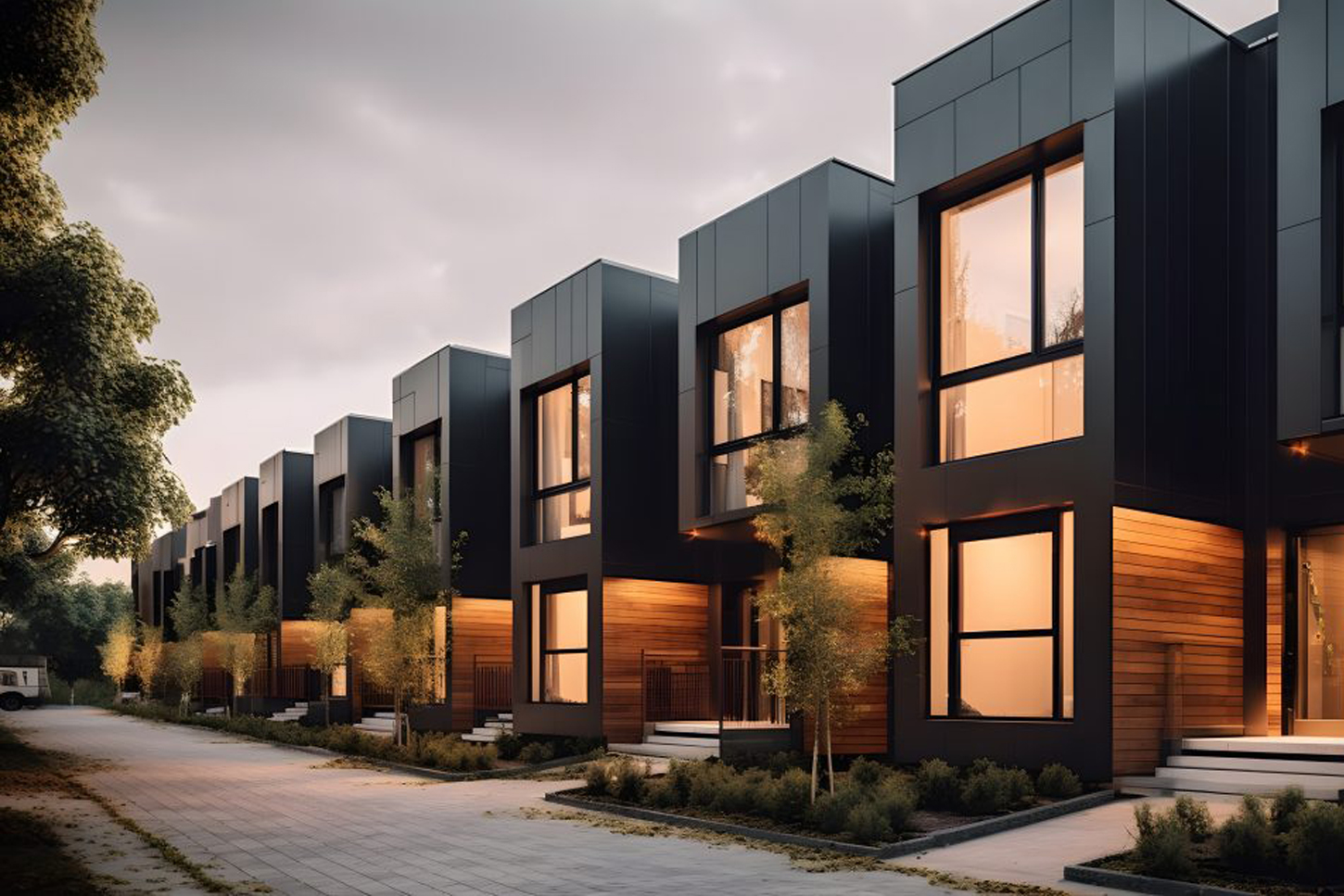Owning a townhouse in Ontario is an increasingly popular choice among homeowners who want to combine the benefits of urban convenience with the comfort and space of suburban living. Townhouses provide a unique housing option that balances affordability, community, and independence. They are particularly appealing to first-time home buyers, families, and downsizers who want the advantages of owning a home without the high maintenance demands of detached living.
In this guide, we’ll explore what defines a townhouse condominium, how it compares to other property types, and the advantages and disadvantages of townhouse living in Ontario’s competitive housing market.
What Is a Townhouse?
A townhouse is a multi-level residential property that shares one or two walls with adjacent units but has its own private entrance, and, often, a small yard or patio. Most townhouses are part of a row development, with several attached homes forming a continuous block. Each unit typically features multiple floors, a private entrance, and designated parking.
In Ontario, many townhouse developments operate as condominium corporations, governed under the Ontario Condominium Act. This means that why homeowner own their individual units, they share collective ownership of common elements such as roofs, driveways, sidewalks, parking areas and landscaped grounds.
The condominium corporation is responsible for maintaining these shared elements, funded by monthly maintenance fees that each owner contributes to. The amount of responsibility an owner has for maintenance fees can vary depending on whether the townhouse is freehold or a condominium.
- Freehold townhouses grant full ownership of the unit and land, including the exterior. The homeowner is responsible for all the maintenance.
- Condominium townhouses include shared ownership of exterior and common areas, with maintenance handled collectively through the condo board and property management service provider.
This distinction allows buyers to choose the level of independence and convenience that best fits their lifestyle.
![]()
How Townhouses Differ from Other Property Types
Understanding how townhouses compare to other housing options can help prospective owners make an informed decision about their investment.
Townhouse vs Condo
A condominium generally refers to a single unit in a mid-rise or high-rise building. Condo owners share walls, ceilings and floors with neighbours and enjoy shared amenities such as gyms, pools, and concierge services. These features make condos ideal for those seeking convenience and a low-maintenance homeownership option, but they can also come with higher monthly fees.
A townhouse condominium, on the other hand, offers the independence of a home combined with some of the maintenance benefits of a condo. Townhouses often feature private entrances, attached garages, and small outdoor areas while maintaining lower maintenance fees than traditional condos due to fewer shared facilities. Many townhome developments also provide shared green spaces or playgrounds that create a sense of community while allowing for personal privacy.
To better understand what condo fees typically include, explore our article Condo Maintenance Fees Explained.
Townhouse vs House
A detached house offers complete home ownership of both the building and land. Owners enjoy full control but also carry the full cost of maintenance, repairs, landscaping, and utilities. Detached homes often come with higher property taxes and are more expensive in Ontario’s urban centers.
By contrast, townhomes provide many of the same lifestyle benefits, such as multiple floors, private entrances, and sometimes attached garages, but at a more accessible price point. Townhouses also reduce the homeowner’s workload since exterior upkeep and shared property maintenance are often handled by a management company.
For many buyers, a townhouse strikes the perfect balance between independence and convenience, particularly in high-density urban markets, such as Toronto, where detached housing is increasingly unaffordable.
Townhouse vs Duplex
A duplex is a two-unit building, either stacked vertically (one unit per floor) or side-by-side. Each unit may have a separate owner or be a part of a single investment property. Duplexes offer more privacy than condos but fewer amenities and community benefits.
A townhouse, however, is part of a larger community of similar houses. Each unit typically has its own front entrance and backyard, while the overall development is managed under a shared condominium structure. This arrangement provides uniform design standards, shared community amenities and professional maintenance. These features can help to preserve your property’s value and simplify ownership.
Townhouse vs Apartment
An apartment is typically a rental unit within a larger residential building managed by a landlord or property management firm. Tenants in apartments pay monthly rent and have limited control over renovations or policies.
In contrast, owning a townhouse allows residents to build long-term equity and customize their living space. Townhouses offer more square footage, greater privacy, and the security of home ownership. They are an appealing choice for those ready to transition from renting to owning without taking on the full cost of a detached home.
![]()
Advantages and Disadvantages of Townhouse Living
Townhouses offer a balanced lifestyle that combines affordability, practicality, and social connection. However, they also come with certain trade-offs depending on location, layout and ownership structure.
Advantages of Living in a Townhouse
Affordability and Value
Townhouses are often more affordable than detached homes, especially in the Greater Toronto Area and other major Ontario markets. They allow first-time homebuyers to enter into the housing market at a lower cost while still enjoying the benefits of home ownership.
Townhouses typically offer a higher price-to-space ratio, giving homeowners more square footage for their investment compared to condos in similar locations. Property taxes and insurance premiums are often lower as well, helping owners manage long-term affordability.
Prime Location in Growing Neighbourhoods
Developers often build townhouse communities in high-growth, transit-accessible areas where land is limited. This provides owners with proximity to schools, shops, parks, and public transportation while still maintaining a suburban feel.
Living in these areas can lead to a strong appreciation potential as communities mature and locate infrastructure expands.
Low Maintenance Living
A major benefit of townhouse living is the reduced maintenance burden. In condominium townhouse developments, the condo corporation or property management provider coordinates exterior repairs, roof replacements, landscaping and snow removal.
This structure provides peace of mind and predictable budgeting, since owners share the cost of major upkeep through monthly maintenance fees. The arrangement is especially appealing to busy professionals or retirees seeking a simplified lifestyle.
Sent of Community
Townhouse communities often have a friendly neighbourhood-focused atmosphere. Shared pathways, parks, and community centers create opportunities for social interaction, while architectural uniformity and managed common areas help maintain curb appeal.
Many owners appreciate the safety and belonging that comes from living in a small, well-connected neighbourhood.
Access to Modern Amenities
Modern townhouse developments frequently feature shared amenities such as playgrounds, fitness rooms, or lounge spaces. These facilities offer the advantages of a condo lifestyle without the scale or anonymity of a high-rise development.
Shared facilities can also increase property values by enhancing the overall community experience.
Improved Energy Efficiency
Since townhouses share at least one wall with neighbouring units, they are typically more energy-efficient than detached homes. Shared walls reduce heat loss, helping owners save on utility costs.
Newer townhouse projects often include sustainable design elements such as energy efficient windows, insulation, and appliances, further lowering long-term energy consumption.
Investment Potential
The demand for townhouses in Ontario continues to rise as home prices in detached markets climb. Townhouses offer strong rental potential, particularly in urban and suburban areas with good transit access. For investors, they can generate consistent rental income while appreciating steadily over time. Owners who maintain their units well and choose desirable neighbourhoods often experience favourable resale returns.
Flexibility in Living Space
Townhouses typically feature multi-level floor plans, making it easy to separate living, working, and sleeping areas. This flexibility supports a variety of lifestyles, from families with children to remote workers who needed a dedicated home office.
Some newer townhouses even include basement suites or secondary units, providing opportunities for multi-generational living or supplemental rental income.
Disadvantages of Living in a Townhouse
Privacy Limitations
While many townhouse builders use advance insulation and design strategies, shared walls can still limit privacy compared to detached homes. Buyers should look for quality construction and soundproofing features if privacy is a top concern.
Limited Outdoor Space
Townhouses generally include smaller private yards or patios, which may not appeal to those who enjoy gardening or outdoor entertaining. However, this means less maintenance and more time to focus on lifestyle and convenience.
Slower Appreciation
Although townhouse values tend to increase over time, they may appreciate more gradually than detached properties. This is because the value is shared among multiple units. Still, their affordability, strong demand, and urban accessibility help sustain long-term market stability.
Higher Density Living
Townhouse communities often feature higher population density than detached neighbourhoods, which can mean shared parking or closer proximity to neighbours. Many owners view this as a reasonable trade off for access to shared amenities, convenient locations, and professional management.
![]()
Is a Townhouse the Right Choice for You?
If you want to balance affordability, ownership, and convenience, a townhouse could be the perfect fit for you. It offers the privacy and independence of a house with the managed care and shared costs of a condominium.
For those seeking a low-maintenance lifestyle without sacrificing comfort or community, townhouse living is an excellent choice. To explore another style of multi-unit housing, read Pros and Cons to Stacked Townhomes: A complete Buyer’s Guide.
Conclusion
Townhouses have become a cornerstone of Ontario’s real estate landscape, offering residents the space of a home, the affordability of a condo, and the ease of shared maintenance. With professional management, thoughtful planning, and community oriented amenities, townhouses provide an attractive lifestyle for a wide range of home owners.
ICON Property Management is committed to supporting condominium boards in maximizing the benefits of townhouse living. Our townhouse condo management services ensure your property is well maintained, enhancing your property value and living experience. Contact us today to learn more about how we can help you manage your townhouse community with ease and efficiency: Request a Proposal.



